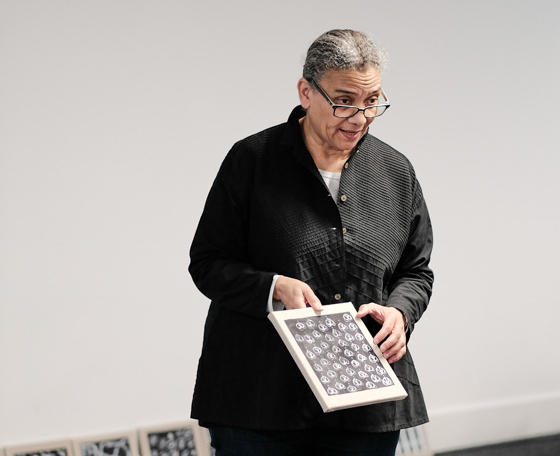IBAR Director Lubaina Himid wins Turner Art Prize for 2017
It is with great pleasure that the Institute for Black Atlantic Research joins in the celebrations of the award to Lubaina Himid of the Turner Art Prize.

In her brilliant career, from her Toussaint series in the eighties, through the brilliant large canvases of her show Revenge (Rochdale, 1992) and her signature piece Naming the Money (Newcastle, 2004) with its wonderful dancing figures to her vivid 2017 retrospectives at Spike Island, Bristol and Modern Art Oxford, she has created work that challenges and delights.
Lubaina is an important artist because she asks the important questions without being overwhelmed by the trauma they induce. Her work on slavery and memory over the last 30 years is an outstanding contribution to art and to ideas. She wants to tell the untold stories and bring new audiences to them, but always these are informed by state of the art scholarship. Long before the importance of working for a memorial to slavery was part of the zeitgeist she was making art that modeled dynamic ideas of how it might be done in her Memorial to Zong (1992) series. Her work is not obscurantist or lazily populist, but engaging, thought-provoking and more than happy to invite the audience in for a conversation.

The sheer volume of work she has produced, despite for many years having a high teaching load, is testament to her energy and commitment. She is a wonderful teacher and mentor urging others to take the risks, that have been so much part of her practice. She is unafraid of what feathers she might rustle and has been a consistent irritant to the art establishment from an informed black feminist perspective. Her politics though is not exclusionary and she has worked fabulously, collegially and professionally in white institutions (from UCLAN to the Tate) to improve them.
I first met Lubaina on the street between buildings at UCLAN, as she had heard I was starting to write about her work. She jokingly said with a smile that I should be careful. Ever since, she has been tremendously generous with her time and ideas, so that my scholarship is always informed by long conversations about the work and its full context. I feel immensely privileged to write about the work. As my co-director of our Institute for Black Atlantic Research here at UCLAN she has been a brilliant interlocutor with audiences far beyond the usual academic suspects. At our conference on The Red and the Black: The Russian Revolution and the Black Atlantic, she tweeted and instagrammed for Britain, determined that the event she loved would have resonances beyond the academic walls. Typical Lubaina working for the common good whilst having the time of her life.
Professor Alan Rice


